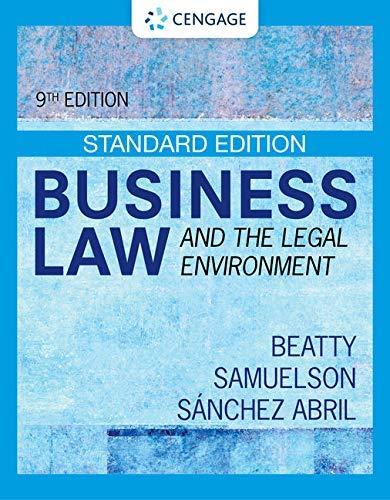Questions are based on International Business Law- Text, Cases and Readings at page 298 except question 5. Q1. Overseas Investment Co (OIC), a multinational enterprise
Questions are based on "International Business Law- Text, Cases and Readings" at page 298 except question 5.
Q1.
Overseas Investment Co (OIC), a multinational enterprise with its headquarters in State W, entered into a joint venture with Investment Promotions Facility Ltd (IPF), a stateowned company whose board of directors and principal officers had been appointed by the minister of finance of State X. The joint venture agreement provided that, in the event of any dispute, the dispute would be resolved by arbitration. Additionally, because the law of State X says that foreign investment agreements must be approved by the minister of finance, the minister was present at the signing of the agreement; and after representatives for the two parties put their signatures on the document, the finance minister added the words "approved and ratified" and his own signature. Unfortunately, a dispute did arise, and OIC initiated an arbitration proceeding according to the procedures set out in the joint venture agreement, naming both IPF and State X as parties. State X responded by arguing that the arbitration tribunal has no jurisdiction over State X. Should State X be excused from participating in the arbitration proceeding?
Q2.
In Nissan Motor Mfg Corp, USA v United States, a Japanese company was required to pay customs duty in a foreign trade zone (FTZ) established in Tennessee. Does this defeat the purpose of a FTZ or free trade zone? Was the case specific to US law or do you think there are principles discussed that could be applied to similar disputes on other jurisdictions?
Q3.
The Modern Exploration Co (MEC), a firm organised in State P, entered into an investment contract with State Q to explore for and harvest magnesium nodules from the seabed of State Q's continental shelf. MEC agreed to pay State Q US$100 million in advance for this privilege. However, State Q did not inform MEC that State Q would be promulgating certain environmental protection laws within days after signing the investment contract that would make the endeavour so expensive that it would be effectively impossible for MEC to perform. When MEC discovered this, MEC asked State Q to either modify the environmental laws or give MEC back its money. State Q refused. MEC then initiated an arbitration proceeding under the auspices of the ICSID in accordance with the terms of the investment agreement and State Q law. How should the tribunal rule?
Q4
Turnip Company, a multinational enterprise headquartered in State T, ordered its subsidiary in State R, the Radish Company, to close and to declare itself bankrupt. The Radish Company did so. However, Radish Company did not give its employees adequate notice of its closing, and its assets were inadequate for funding the termination payments due the employees under State R law. In the bankruptcy proceeding, the employees asked the bankruptcy tribunal to order Turnip Company to fund the termination payments that Radish Company owed them. In support of this, the employees introduced evidence establishing that Turnip Company had known for some time that Radish Company was an unprofitable subsidiary and would have to be closed; and that, in anticipation of this, Turnip Company had taken assets belonging to Radish Company out of State R so that they would be unavailable at the time of the bankruptcy liquidation. How should the tribunal rule?
Q5
The Loewen Company (Loewen) is a Canadian-based company that has invested in more than 1,100 funeral homes across Canada and the United States (US). Its aim was to buy up as many funeral homes as possible so that it could boost prices charged and its profit. O'Keefe ran a local funeral business in Mississippi US and sued Loewen in Mississippi state Court alleging that Loewen had committed unlawful anti-competitive acts intended to drive O'Keefe out of business. At the trial, both O'Keefe's legal counsel and the trial judge made repeated references to Loewen's Canadian nationality, made suggestions that Loewen did business only with white people, and made appeals to class-based prejudice. The Mississippi jury upheld O'Keefe's claim and rendered a verdict of $500 million against Loewen. The trial judge was African-American and so too were 8 of the 12 jurors. Loewen appealed the jury verdict to a higher court but wanted to be exempt from posting a bond of 125% of the damages owed ($625 million), which bond posting was common practice in US state Courts. Loewen's request to be exempt from the rule was rejected and an appeal by Loewen against the rejection was dismissed by the Mississippi Supreme Court. Rather than post the large bond or pursue other legal avenues, Loewen reached a settlement with O'Keefe for approximately $150 million, ie 30% of the jury verdict. Loewen then filed suit against the US in ICSID relying on Chapter Eleven of the North American Free Trade Agreement claiming that the bond requirement effectively forced Loewen to settle and denied its right to appeal, which was a violation of Art 1105(1) that provides: "Each party shall accord to investments of investors of another party treatment in accordance with international law, including fair and equitable treatment ...". Loewen seeks $725m in compensation from the US for the violation of its rights as an investor. Note: A lack of due process leading to an outcome which offends a sense of judicial propriety is enough for "manifest injustice" under international law. How should the ICSID tribunal rule?
Step by Step Solution
There are 3 Steps involved in it
Step: 1

See step-by-step solutions with expert insights and AI powered tools for academic success
Step: 2

Step: 3

Ace Your Homework with AI
Get the answers you need in no time with our AI-driven, step-by-step assistance
Get Started


